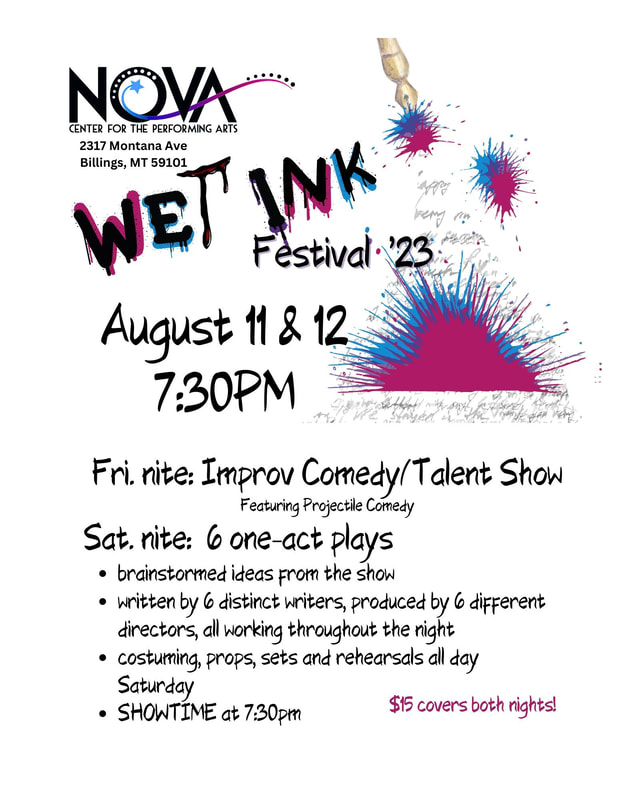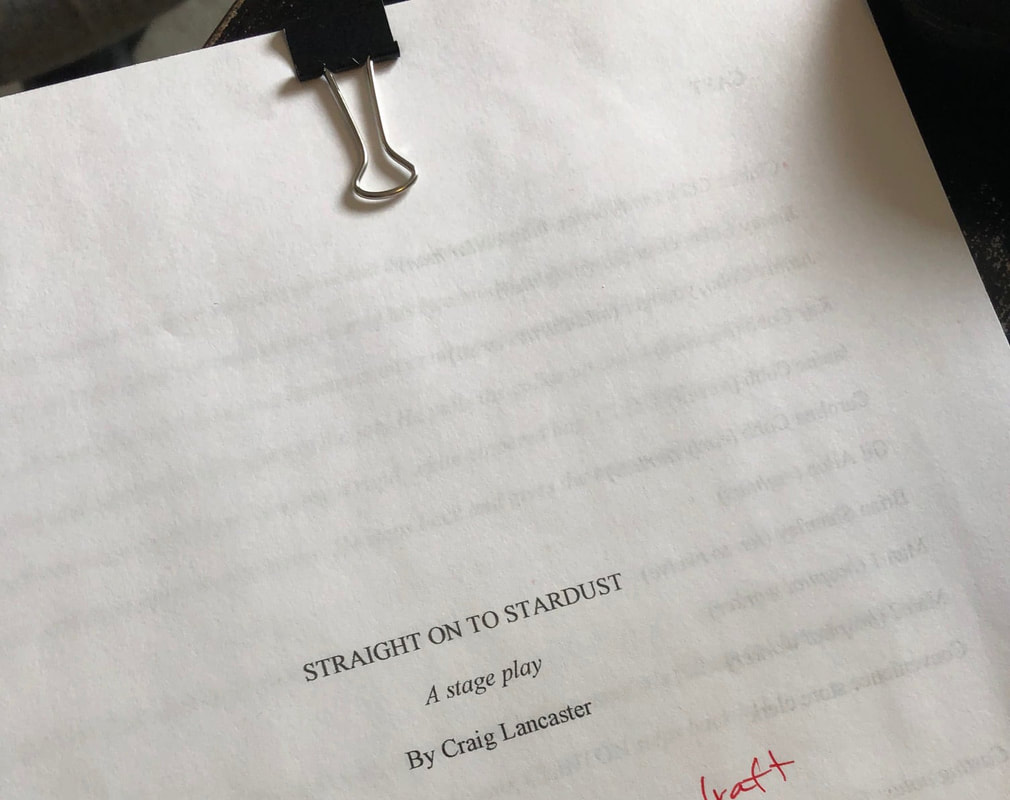|
8/18/2023 0 Comments We Love the Stage*As I write this, I'm nearly a week out from one of the most extraordinary creative experiences of my life. On Friday, Aug. 11, after watching a talent/improv show and getting writing prompts from that, I and five other writers hunkered down at NOVA Center for the Performing Arts in Billings, Montana, and wrote six original one-act plays. We had less than 12 hours to finish our work. After that, six directors and cast members handled rehearsals, costuming, and the construction of sets. On the second night of the Wet Ink Festival 2023, those six one-act plays were presented. It was pure exhilaration, from start to finish. I marveled at the talent all around me—the writers, the directors, the performers, the indefatigable nature of our organizer, Gustavo Bellotta. The audience that showed up to celebrate with us. I entered the weekend having serious doubts as to whether I had the stamina for such an endeavor. I left wanting to do it again. And again. Some time back, I added a Plays section to this website. I'm hesitant to claim the mantle of playwright, but I'm also determined. Two of my one-acts have now been staged. I expect news soon about bigger things. Mostly, I'm just so thrilled to learn more about how to do this and give my storytelling another outlet, one that's very much complementary to the solitary nature of writing novels. As I wrote on Facebook, part of the joy—and the melancholy—of Wet Ink is that creation bloomed in one evening, was presented in another, then was gone with the wind. These plays will probably never be presented again, at least not in the form they took last weekend. Maybe someone has a bigger idea that will grow out of that one act. I think my play, titled Your Mouth Is Moving a Lot, is probably one-and-done. But the shows must go on. Our host for the weekend, NOVA, has a long-term mission of bringing high-quality performances to Billings. To help with that in a modest way, I'm selling digital copies of my script for $3. All net proceeds get turned over to NOVA. If you're inclined to help, you have my gratitude. *—from the song of the same name by the Pernice Brothers.
0 Comments
2/23/2022 0 Comments Straight On To StardustHere's a hard life lesson that writing has taught me: patience. It's a quality I don't naturally have in reserve, and that struggle to find it has benefitted and afflicted me in equal measure in what I do, how I relate to people, how opportunities have come to me, and how I've blown things by being too over-eager. Writing, it turns out, doesn't much care whether you're patient or you're not. The actual act of it comes at its own pace, and sometimes you have to be patient in the extraction. You have something out on submission? Wait. You want an agent's attention? Wait. An idea isn't quite working the way you hoped it would? Set it down and wait. You think you don't have time? Sorry. You do. Wait. So let me tell you about Straight On To Stardust and how it came to be whatever it is now ... Back in 2017, I had this idea for a novel I wanted to write: The basic premise—and that's all I ever have at the outset, which often results in a half-baked unfinished thing that validates Stephen King's idea that writing a novel is like trying to sail a bathtub across the ocean—was a guy with his father's lifeless husk in the bed of his pickup, his father's dog in the passenger seat, and a trip from Montana to New Mexico for the burial. What happened from there is ... well, a lot of stuff that I'd rather not say here, because I hope you someday see the play. That's the real story, anyway. I started with an idea for a novel and ended up with a play. That's the arc. But the color and light of the story lie in the turns in between. The novel idea died. As dead as the father in the back of the truck. I didn't get enough of it down to harvest the wreckage for a short story, which sometimes happens. Dead, dead, dead. Doornail. D-E-A-D. So then a lot of stuff happened. I set it down. I worked on something else with my wife, Elisa. I went to a lot of plays, which is just about my favorite thing to do. I saw The Glass Menagerie, and then I read it, and tried to stare deep into the craft of the thing. And after a while I saw a different narrative approach to my dead story about a dead father. I was living in Maine now, and I started to recast the thing, straight dialogue and stage direction. I didn't have the slightest idea what I was doing, and I loved it. That died, too. Or at least went into convalescence. We came back to Montana. I finished a manuscript that had been languishing in Maine, something I felt good about but couldn't summon the energy to attack back there. Those were tough days on the East Coast, where we'd moved with great hope but hadn't found a way to make home. Coming back to Montana unlocked a lot of things. And It Will Be a Beautiful Life, certainly, but also my willingness to pull a half-finished play born of a quarter-finished novel out of the drawer and have another go. This time, I finished it. And my good friends at Yellowstone Repertory Theatre, god bless them, having seen a pandemic wipe out a season, did a table read on Zoom. That was a fun night, and there were many fine things said about my play, and also many on-target comments about how it could be improved. Notable among these was that it felt more like cinema than stagecraft, an assessment echoed by my Tony-winning high school friend, so I, of course, accepted that, even if I wasn't exactly sure how to address it. So ... patience. I put it away and let it be for a while. I pushed down the road on two manuscripts that I hope to finish one day, then started and finished a third. We moved into our second year of being back in Montana. Life opened up. Delta and omicron came crashing in. And then, finally, in January of this year, my wife and I, for her birthday, attended a play for the first time in nearly four years. Christian O'Reilly's Chapatti is a wonder. Two actors. One stage. Nineteen unseen cats. One unseen dog. The vast preponderance of the dialogue directed at the audience. Exposition out the ying-yang. The fourth wall taken down before the first curtain comes up. I loved every blessed word of it. And nestled among all those words were some ideas about what was ailing my play. Earlier this month, I took a mighty swing at it and did a major revision. What happens now? I'm not sure. There's talk of a public table reading. I'm hoping for a production. That would be beyond any dream I had when I began writing it. I sure enough know I'm going to want to write some more plays, if I can find some properly propulsive ideas.
What have I learned? Quite a lot, actually. The most important thing: This doesn't happen without patience. I'm not naturally imbued with it, but man, I do appreciate what comes from being forced to find it. |
About CraigCraig Lancaster is an author, an editor, a publication designer, a layabout, a largely frustrated Dallas Mavericks fan, an eater of breakfast, a dreamer of dreams, a husband, a brother, a son, an uncle. And most of all, a man who values a T-shirt. Archives
July 2024
By categoryAll 600 Hours Of Edward And It Will Be A Beautiful Life Awards Books Bookstores Community Connection Craft Craig Reads The Classics Dreaming Northward Education Edward Adrift Family Geography History Libraries Memory Montana NaNoWriMo Northward Dreams People Plays Poetry Public Policy Q&A Social Media Sports Stage Texas The Fallow Season Of Hugo Hunter The Summer Son This Is What I Want Time Travel Work Writers Writing Archives
July 2024
|




 RSS Feed
RSS Feed